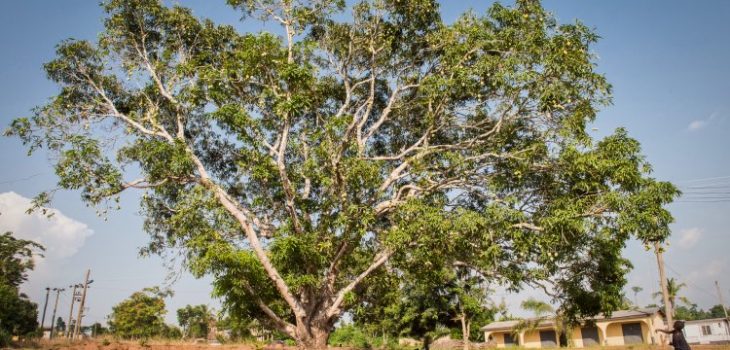Serendipalm is run by a team of Ghanaian professionals, under the guidance of Managing Director Safianu Moro, together with the support of Dr. Bronner’s Special Operations Team.
Serendipalm’s oil mill was modeled on the small palm oil mills that are found in this region of Ghana, but it offers more efficient and safer technology, better compensation and social benefits, as well as development opportunities for employees. With more than 250 employees (mostly women who have not completed secondary education), the mill is the most important employer in Asuom.
Despite mostly dispensing with production automation and using a lot of manual labor instead, we emphasize efficiency, good process management, and oil quality. After all, fair trade projects also need to satisfy their customers’ demand for high quality and value.
Serendipalm sources palm fruit from over 600 organic smallholder farmers. Organized into 4 local associations, they deal directly with Serendipalm for the purchase and collection of palm fruits. The farmers receive a ten percent organic premium on top of the going market price. Their fruits are weighed—not merely gauged, as is customary—and payment is made within two days.
Serendipalm’s agricultural engineers check that farmers are complying with organic and fair trade rules and are paying fair wages to their field hands.
Since 2013, Serendipalm has distributed approximately 110,000 high-yield oil palm seedlings to our farmers and staff on interest-free loans. To increase species diversity, farmers must plant them in conjunction with other trees. We have now devoted this program to the promotion of replanting using the principle of “dynamic agroforestry”.
Our farmers’ oil palm fields are surrounded by small-scale citrus and cacao fields—there are no large monocultures. Many of our oil palm farmers also cultivate cacao, and Serendipalm has enabled several hundreds of them to switch to the organic production of higher-priced organic and fair trade cacao.
Production employees are well paid—typically earning 20% more than the prevailing local wage. Benefits include paid vacation, sick leave, and maternal leave, as well as contributions to a retirement fund and health insurance—none of which are typically given to employees in the surrounding oil palm mills.
Other advantages: a daily free hot meal; bonus payments at Christmas and Easter; an emphasis on treating one other with respect; employees are actively involved in planning and improving operations; training programs for new employees; a constructive “working atmosphere” that is much admired by visitors.
All by-products from the production of palm oil are put to use. Palm kernels go to Alaffia, an allied fair trade project in Togo. Fruit skins, husks, and fiber are used as mulch and fertilizer, thereby returning mineral nutrients and biomass to the soil.
Serendipalm operates a 2 ha (5 acres) farm that demonstrates dynamic agroforestry to farmers. It also produces fruits and vegetables for the professional kitchen that feeds all staff at the oil mill.
All palm oil customers pay a fair trade premium as part of the purchase price. Our current premium revenue amounts to around $85,000 per year. A Fair Trade Committee made up of farmers, Serendipalm employees and management decides on how to use these funds. Serendipalm coordinates and oversees the projects which address local needs.
